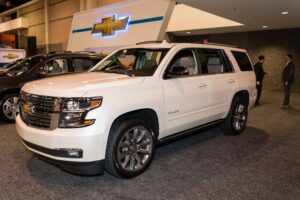The Chevy Tahoe is the brand’s full-sized Sports Utility Vehicle named after Lake Tahoe. It is closely related to other Chevrolet lineups such as the Hummer, Escalade, and Suburban.
Having connections to many well-regarded lineups, the Chevy Tahoe also has very high expectations.
Unfortunately, like any other car, the Chevy Tahoe has its issues. These issues prevent the car from starting, making the user go, why won’t my Chevy Tahoe start?
The cause of this issue is usually the battery or other components but could be in other car systems.
The most common problems for the Chevy Tahoe are:
- Low Charged/Dead Battery
- Starter Problems
- Bad Fuel Pumps
- Ignition Problems
- Alternator Issues
If you believe that your Chevy Tahoe is suffering from any of these problems, read this article, as I will be discussing them in great detail for your convenience.
Table of Contents
- 1 What Would Cause A Chevy Tahoe To Not Start?
- 2 Frequently Asked Questions
- 2.1 Q1. Why Won’t My Chevy Tahoe Start With New Battery?
- 2.2 Q2. Why Won’t My Chevy Tahoe Start Even With A Jump?
- 2.3 Q3. Why Won’t My Chevy Tahoe Start But Lights Work?
- 2.4 Q4. Why Won’t My Chevy Tahoe Start But Cranks?
- 2.5 Q5. Why Won’t My Chevy Tahoe Start Just Clicks?
- 2.6 Q6. Why Won’t My Chevy Tahoe Start In The Cold Weather?
- 2.7 Q7. Why Won’t My Chevy Tahoe Start After I Get Gas?
- 2.8 Q8. Why Won’t My Chevy Tahoe Start But Radio Works?
- 3 Conclusion
What Would Cause A Chevy Tahoe To Not Start?

The slightest issue in a component of a car can cause major issues, and this is true for the Chevy Tahoe as well.
Components may have a fault or defect preventing them from working properly, and entire systems may fail.
In the case of the Chevy Tahoe, it is usually among the main problems listed above, which I will discuss below.
1: Low Charged/Dead Battery
A battery is responsible for providing the energy needed for the car to start. It is also responsible for powering other components of the car, such as the lights and other gadgets.
The battery is an integral part of any car and requires a lot of maintenance.
If you cannot maintain the battery, you will surely suffer from major issues which will lead you to not be able to start the car.
If you find yourself being able to power on lights and other equipment in your Chevy Tahoe but unable to start the car, you may have a battery problem.
This can be confirmed if you hear rapid clicking while starting the car. This sound could mean anything, but more often than not, it indicates an issue in the battery.
What Should You Do About It?
- Conduct a voltage test to see if the battery is working optimally. If the battery’s voltage output is less than 12 volts, then your battery is to blame.
- If you have another car or can easily access one, you should consider getting a jumpstart. This will recharge the battery, allowing it to be capable of starting the car.
- If your battery has been in use for more than four years, you should consider getting it replaced. A car battery usually lasts 4 to 5 years and should be replaced when it repeatedly shows issues.
2: Starter Problems
As the name suggests, the starter is what turns or cranks the engine, starting the entire process which starts the car.
A starter is usually electric or hydraulic. Either is prone to many issues, leading to issues in starting your Chevy Tahoe.
If you have been using your car as a daily driver, then it is likely that your starter has an issue that prevents the car from starting.
While attempting to start your car, if you hear a single click, you have another indicator that your starter motor is failing.
A defective or failed starter motor will not be able to crank the engine, causing no combustion. This will make it impossible for you to start your Chevy Tahoe.
What Should You Do About It?
- You should note how long you have been using your current starter. A starter typically lasts 100,000 miles. If you are over this milestone or near it, you may have a starter near the end of its lifetime.
- If your starter is brand new and showing issues, then a trip to the mechanic should help identify any issues, either in the motor or in the starter itself.
- Regardless of the situation, it is recommended to get your starter replaced as fixing it could cost more than getting it replaced and leaves room for more issues to arise in the future.
3: Bad Fuel Pumps
It is not enough that you top up your fuel tank with gas. You also need to ensure that all the fuel is safely and efficiently reaching the engine.
This means that you need to take care of the fuel system of your Chevy Tahoe.
While clogs can occur due to old oil filters and fuel injectors collecting rust, faulty fuel pumps are to blame more often than not.
The fuel pumps draw out the gas from the tank and push it to the engine via pipes. If a fault occurs in the fuel pumps, they can easily reduce the fuel’s pressure reaching the engine.
Bad fuel pumps can also overheat and cause the car to overheat.
They deliver improper amounts of gas to the engine, which makes it difficult to start. They can also cause the car to frequently shut down, making loud whining sounds.
What Should You Do About It?
- Carefully check if the engine is sputtering if you accelerate while trying to start the Chevy Tahoe. If it does, you can safely say there are clogs in the fuel system.
- Replace the fuel filters and clean up the fuel injectors to avoid any issues like this in the future.
- If you believe there are issues with the fuel pumps, you should visit a mechanic and have them assess the fuel pumps.
- If the mechanic detects any faults in the fuel pumps, you can opt to fix them. It is recommended to replace the fuel pumps entirely.
4: Ignition Problems
The Chevy Tahoe is particularly known for issues in its ignition system. Various components of this system fall victim to a variety of different problems.
The affected components include the ignition lock cylinder, ignition switch, and ignition lock assembly.
All three parts can easily wear out and have been reported to have been replaced by owners of the Chevy Tahoe.
Heavy key chains wear out the ignition switch and cylinder, causing major difficulties in starting the car. This can grow to the point where the car will not start.
Sudden stalls become common, and the car develops issues in powering accessories. You may also develop issues turning and inserting/ removing the key.
All of these are serious symptoms of problems in the ignition system and should be resolved as soon as possible.
What Should You Do About It?
- You should start by taking care when you insert or remove your car key. This is because doing this roughly can cause massive wear and tear on the ignition cylinder.
- You should also use light key chains that do not wear out the ignition switch.
- As has been the case for most owners, sometimes replacing the entire system is the more sensible option.
- The system can degrade to the point where it can become borderline unusable and will have to be replaced if you want to be able to start your Chevy Tahoe.
- Replacing fuses, circuits, and replays can also fix the electrical system intact with the ignition system.
5: Alternator Issues
One of the most problematic components after the car battery is the alternator. The alternator is designed to recharge the battery.
It does so by converting the engine’s mechanical energy to electrical energy and sending it to the battery.
This allows it to be charged, preventing it from draining as you drive your Chevy Tahoe. As you can imagine, several issues can arise if your alternator develops a problem.
More often than not, people think that the battery is to blame and attempt to jump-start the car or replace it.
This temporarily fixes the issue but does not solve it entirely, as the problem is in the alternator.
If you have been experiencing battery warning lights or trouble starting and frequent stalling, the alternator may be the source of the problem.
Further signs could be growling and whining noises from the alternator and the battery dying.
What Should You Do About It?
- The best way to determine if the alternator is to blame is to track how long the battery lasts. If your battery frequently loses its charge, you can be sure it’s due to a faulty alternator.
- You can look for visible signs of damage on the alternator, but it is not recommended to go further.
- Your best option would be to visit a mechanic and have them solve the issue with the alternator or replace it entirely.
Frequently Asked Questions
Q1. Why Won’t My Chevy Tahoe Start With New Battery?

The battery of your Chevy Tahoe may not have been properly installed, which could be why it is causing many problems.
Additionally, it could be other issues such as corrosion or frayed wires, which you should look for and have replaced and changed.
Q2. Why Won’t My Chevy Tahoe Start Even With A Jump?
A jump start will fully recharge the battery of your Chevy Tahoe, but if the battery is not the issue, your Chevy Tahoe will still not start.
You could have fuel problems or issues with the ignition system, which you will have to get checked out by a professional.
Q3. Why Won’t My Chevy Tahoe Start But Lights Work?
The lights do not require much power, so a low-charged battery may be able to turn them on.
This is not the case for starting the car. You will have to jump-start to recharge the Chevy Tahoe or replace it entirely.
Q4. Why Won’t My Chevy Tahoe Start But Cranks?
If your Chevy Tahoe is cranking, you can assume that your electrical system and starter system are fine and that the main issue lies elsewhere.
This issue could be in the fuel system or with the ignition system. The best thing to do is to get it checked out via a professional.
Q5. Why Won’t My Chevy Tahoe Start Just Clicks?
Clicking in the Chevy Tahoe almost guarantees that the problem is in the electrical system. This can be quite difficult to pinpoint as there are a lot of intricate components in this system.
Again, you should have it checked out by a mechanic that knows what they are doing.
Q6. Why Won’t My Chevy Tahoe Start In The Cold Weather?
Cold weather slows the battery’s power output and makes it difficult for the starter system to work, making it quite difficult to start your Chevy Tahoe.
Certain components also need to be at a certain temperature to work properly, and the cold may be limiting them from doing so.
Q7. Why Won’t My Chevy Tahoe Start After I Get Gas?
Issues with the fuel system, either faulty fuel pumps or blockages, can prevent your Chevy Tahoe from starting, despite the car having a full fuel tank.
The engine requires a decent amount of fuel to start, which it won’t be able to do if these problems exist.
Q8. Why Won’t My Chevy Tahoe Start But Radio Works?
The radio also uses very minimal power, just like the lights, allowing it to work when the battery is low on charge.
The solution is the same for the lights; to either get the battery replaced or have it jump started, allowing the Chevy Tahoe to start easily.
Related: What Are The Worst Years For The Chevy Tahoe?
Conclusion
The Chevy Tahoe has been regarded as the best-selling Sports Utility Vehicle in the United States. It frequently outsells its competition twice over and provides quality cars to the public.
Despite this, there are issues with the Chevy Tahoe that make people question, “why won’t my Chevy Tahoe start?” It can be quite frustrating to have your car not work properly and not start at all.
With the help of this article, this should no longer be the case. Now you should have the means necessary to identify these problems and formulate the correct solution.

I am Tahir Azam, and I have been writing amazing articles for TaxiHack for as long as I can remember. I know everything that is to know when it comes to automobiles and is always on top of industry news and developments. While I am not an expert by any means, I pride myself on knowing the ins and outs of many different problems and, of course, their solutions. The articles on our website are some of the best and well-researched content that you will find, and I spend countless hours making sure this remains to be true. This is why I ask you to take your time out and read some of my articles, especially if you find a topic that resonates with you or is something you are looking into. This way, you will find the perfect mix of information and tips on your desired topic. Learn more about Tahir.

